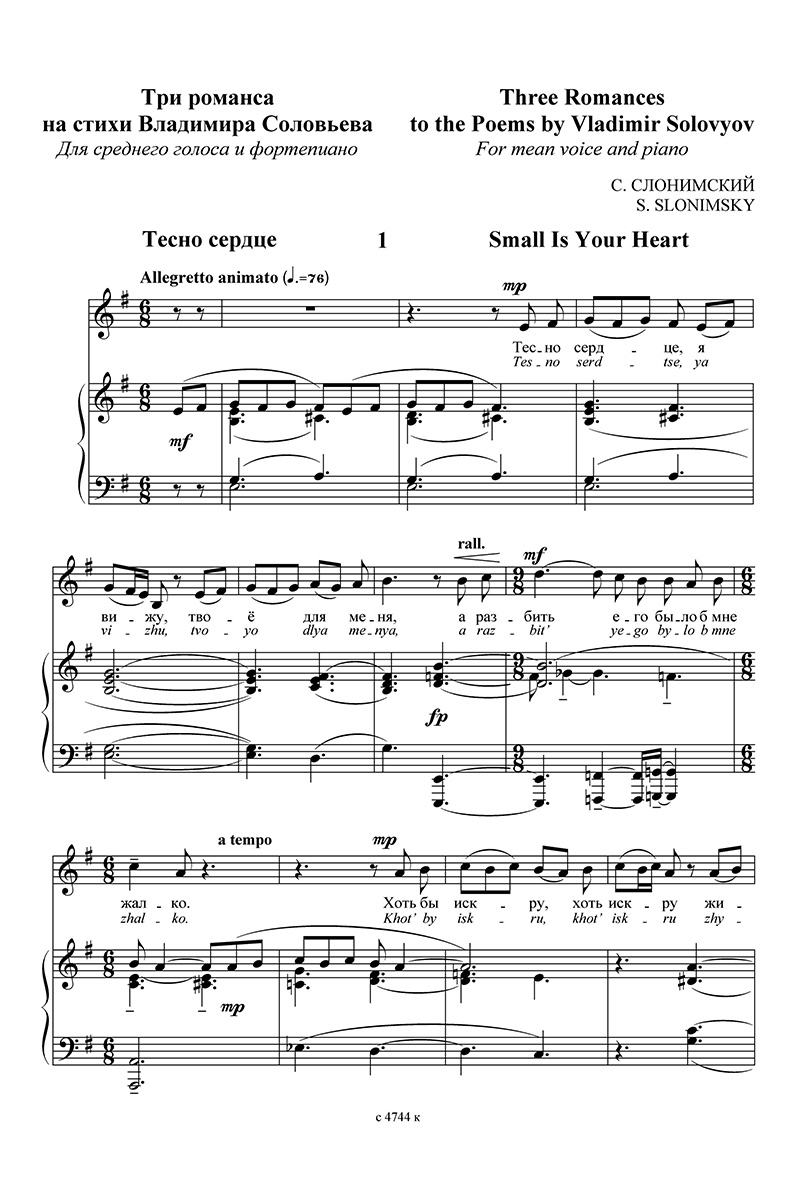
Slonimsky S. 3 Romances to the verses by V. Solovyov for mean voice and piano
- Author:
- Slonimsky S.
- Author (full):
- Sergei Slonimsky
- Title (full):
- Three Romances to the Verses by V. Solovyov for mean voice and piano
- Number of pages:
- 16
Sergei Mikhailovich Slonimsky (born in 1932) is one of the leading modern Russian composers. His creation embraces actually all the genres. Remember the musical drama “Virineya” (1965–1967) after the novel by L. Seyfullina, chamber opera “Master and Margarite” (1970–1972) after M. Bulgakov, opera-ballad “Mary Stuart” (1978–1980) to Ya. Gordin's libretto, dramma per musica “Hamlet” (1990–1991) after W. Shakespeare's tragedy translated to Russian by B. Pasternak, chamber opera (monodic drama) “King Ixion” (1993–1995) after the ancient myth and the tragedy by I. Annensky, the Russian tragedy in 14 visions with three epilogues and overture “The Visions of Ioann Grozny” to Ya. Gordin's libretto, dramma per musica “King Lear” (2000–2001) after the tragedy by W. Shakespeare translated by B. Pasternak, “Antigona”, oratorial opera after Sophocles' tragedy, 17 symphonies, ballets, instrumental concertos, cantatas, among which there is the “Voice From Choir” (1962–1963) to the verses by Alexander Blok, “One Day of the Life”(1998) to the texts by “Chapter of the Thousand” by Dhammapada translated by V. Toporov, Requiem for soloists, choir and symphony orchestra (2003), so as numerous choral, chamber-instrumental and vocal compositions. The spring of 2005 was marked by the ballet premi?re of the “Magic Nut” after the tale by E. Th. A. Hoffmann to the libretto by the artist Mikhail Chemiakine, who staged it in the Mariinsky Theatre.
Sergei Slonimsky is the People's Artist of Russia, laureate of the Russian State Prize, knight of the Commander Cross of the Order for Merits before the Polish Republic. Slonimsky's opuses are on roll all over the world.
In 2007 Sergei Slonimsky created Three Romances to the verses by the great Russian philosopher Vladimir Sergeyevich Solovyov (1853–1900), whose poetical experiences were akin to the tradition of Afanasy Fet and Alexey Tolstoy. Solovyov's scientific religious conception of spiritual universal transformation, influenced such poets-symbolists as Alexander Blok and Andrey Beliy.
- Author
- Slonimsky S.
- Author (full)
- Sergei Slonimsky
- Title (full)
- Three Romances to the Verses by V. Solovyov for mean voice and piano
- Number of pages
- 16

